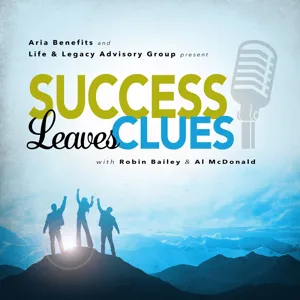Podcast Summary
The Story Behind Tory Burch's Global Fashion Brand: Building a successful consumer brand requires a unique point of view and a balance of affordability and sophistication. Tory Burch's father's style inspired many of her designs and despite personal challenges, she compartmentalized and grew her brand.
Tory Burch founded her fashion brand in the early 2000s and grew it into a global brand with 370 stores around the world. Being well-connected isn't enough when building a consumer brand because at the end of the day, consumers have to like what you sell. The brand's success is due to its point of view: creating clothing and accessories that were timeless and beautifully designed, but that lived in that zone of aspirational affordability. Despite the drama happening behind the scenes, she compartmentalized and still grew the brand. Tory Burch's father, despite never really working, was an incredibly kind and stylish man that spent time traveling, spending lots of time in Europe and dating many women before meeting Tory's mother. His clothing and style inspired many of the designs that Tory created over the years.
Tory Burch's Unexpected Path to Fashion Success: Your career path may not be what you initially planned, but every experience can lead to unexpected opportunities and success. Stay open-minded and take on any opportunity that comes your way.
Despite being known for her fashion line, Tory Burch was a tomboy in her childhood days and only wore a dress when she was in high school. She studied art history at the University of Pennsylvania, and after graduation, she had to find a job, which led her to the fashion industry. She sent many resumes, including one to a minimalist designer, Zen, who didn't have a boutique but sold wholesale. He offered her a job that required her to do anything that needed to be done. Working for Zen was an amazing induction into the fashion world, which led to Tory Burch's future success, even though fashion wasn't her plan.
Tory Burch's Journey to Becoming a Designer: Tory Burch's childhood interests, exposure to the fashion industry, and love for vintage clothing and her mother's style led her to create a successful fashion brand.
Tory Burch's interests in fashion began early in life by watching her parents' sense of style that inspired her to develop her own unique fashion style. While working as an assistant at Harper's Bazaar and Ralph Lauren, she was exposed to different aspects of the fashion industry but was turned down when she submitted a design project. However, her love for vintage clothing and her mother's style inspired her to become a designer. She didn't find the fashion industry cutthroat as popularly portrayed in the media and her experience at Ralph Lauren was fascinating. Mary Randolph Carter, her boss and a quintessential Ralph model, still works at Ralph Lauren today.
Tory Burch's journey as a fashion designer turned stay-at-home mom.: Balancing a career and motherhood can be challenging, and sometimes tough decisions have to be made. It's okay to prioritize family when necessary.
Tory Burch, a famous fashion designer, used to remake clothing with a tailor, even in high school. She started doing jobs in fashion, including PR at Vera Wang and LV m h. She met Chris Birch and got married in 1996, becoming Tory Robinson Birch. Chris built a big preppy company called Eagle's Eye with his brother. Tory had five children, three stepdaughters, and two twin boys. She had to make a tough decision to leave her career at LV m h and become a stay-at-home mom, as it was too much to balance with three babies under the age of four.
Tory Burch's Determination to Start Her Own Brand.: Start a business to fulfill a larger goal and identify a gap in the market to differentiate your brand. Be confident in taking the leap, even if you don't fully understand the work involved.
Tory Burch had various ideas for starting companies before but was tired of discussing them without any fruition. She landed on starting her own business because she wanted to start a foundation and realized it would be easier with her own big company. She did not always plan to be a designer, but her determination grew with her work experiences. She was confident in taking the leap to start a company even though she did not fully understand the work it entailed. She identified a gap in the market for attainable luxury clothing that was not already filled and decided to start her own brand, filling the gap in the market.
Tory Burch's Vision of Attainable Luxury and Emotion-Driven Fashion: Success in the fashion industry does not depend on a high price point. Rather, relatable and emotion-driven designs can help create a more inclusive brand. Trusting one's vision and seeking guidance from experienced collaborators is a key to success.
Tory Burch's idea of luxury is not about a price point, but about emotion and how something makes you feel and time. Her mother's love for fashion and the way it made her feel awakened her passion for it. Her idea of attainable luxury ensured that her vision was relatable to a wider range of audience. The brand Jax, which was no longer in business, was her inspiration for relaunching a brand that appealed to various stylish women, which was perfect for any occasion. Collaboration with people with vast experience helped Tory's brand succeed. Having trust in one's vision helps in bringing it to fruition, and this means learning from different sources and taking the chance to reach out.
Tory Burch's Journey to Building a Successful Fashion Brand: Perseverance, adaptability, and vision are crucial for building a successful fashion brand. Focus on quality and cater to the needs of your target audience while keeping in mind the idea of direct-to-consumer. Invest in your vision.
Tory Burch faced rejection when she tried to buy a brand for relaunching but didn’t give up and proceeded to make a brand bible. She regrouped her thoughts and focused on quality and luxury under a different price point, while also keeping in mind the idea of direct-to-consumer. From concept to launch, Tory thought about everything from footwear to jewelry and focused on being a problem solver for busy women who wanted to look chic. Starting a fashion brand is hard and requires significant cash, but Tory invested $2 million to set up the production in Hong Kong. This shows that perseverance, adaptability and vision are essential traits for entrepreneurship.
The Origins and Growth of Tory Burch's Fashion Brand: Tory Burch's iconic logo was inspired by her love for art, and her commitment to partners and customers fueled the growth of her fashion brand. She prioritized direct-to-consumer sales and building relationships with manufacturers before expanding to e-commerce and wholesale distribution.
Tory Burch's iconic logo was inspired by her interest in Moroccan and Chinese art, and its polarizing nature made it memorable. She initially focused on direct-to-consumer sales and establishing relationships with manufacturers in Hong Kong, which Chris helped with due to his experience building a brand. The brand's growth was fueled by long dinners and conversations showing their commitment to partners and customers alike. Although the eventual idea was to reach more people through e-commerce, Tory Burch did not start with wholesale distribution in mind. Instead, she aimed to build a fashion brand that also had a retail location.
Tory Burch's Patient Approach to Building a Luxury Brand: Taking time to pay attention to design details and quality can help a brand stand out, even when manufacturing in Asia. Starting small with core products can lead to remarkable success in luxury fashion.
Tory Burch wanted to be a patient brand and not the biggest brand. She took her time to carefully design each product and paid attention to the details. The name of the company was changed to Tory Burch from Tori by TRB. She found a location in Tribeca, New York, and opened her first store during fashion week. The products were manufactured in Asia, but the attention to design detail and quality made them stand out. She started her company with a few products like sweaters, kaftans, and vintage tunics that became core pieces of her collection. Eventually, she became a remarkable designer and learned a lot about designing impeccable luxury products.
Tory Burch's Journey to Embracing Ambition and Building a Global Company: It's important for women to embrace their ambition and not shy away from big dreams. Success may not come overnight, but staying dedicated and persevering through challenges can lead to incredible achievements.
Tory Burch felt that the notion of being ambitious was distasteful for women as it was in the ether that way back then. She was contacted by a friend who made her realize that she should embrace the word ambition and not shy away from it. Tory imagined big that she wanted to create a company that reached a lot of women and build something globally on opening her first shop. It was the most exhausting year and obeyed by 18 other years, but it was crazy and a whirlwind. The opportunity to be on Oprah's show opened a new chapter for her in 2005, and e-commerce didn't become a significant part of her business for a few more years after that.
Belief in Self and E-commerce: A Success Story from Tory Burch: Tune out negativity and trust in your abilities, regardless of background. Embrace e-commerce to grow your business, and rely on a strong support system for resilience during tough times.
E-commerce played a crucial role in Tory Burch's successful business, especially during the pandemic. Despite facing criticism and sniping early on, Burch learned to tune it out and believe in herself. She did not consider herself a designer until four years ago, but worked hard to build her company and brand. Support from her family, especially her mother, was her strength during tough times. The negative perception of Burch's wealth and background did not deter her from taking a big risk when launching her company. She advises to tune out negativity and focus on self-belief and hard work for a successful business.
Building a Successful Fashion Brand with Innovation and Persistence: Building a successful brand requires innovative ideas, identifying and acting on industry trends, and persistence in momentum despite challenges. Word of mouth marketing and strategic partnerships can also be key to early success.
Tory Burch's brand was initially built in a scrappy way, with trunk shows and word of mouth marketing. The iconic Riva ballet flat, designed with the brand's logo on it, became hugely popular and was worn by celebrities like Jessica Alba and Cameron Diaz. Tory was careful about licensing deals to avoid diluting the brand. She used her industry connections to get her products to well-known people and relied on them being photographed. The brand's success can be attributed to Tory's innovative ideas, her ability to identify and act on trends in the fashion industry, and her persistence in building momentum despite facing chaos and uncertainty during the early stages of her business.
The Impact of Word of Mouth Marketing on Tory Burch's Business and Personal Life: Word of mouth marketing is a powerful tool, but the instant gratification of social media can hinder the process of building and learning about a brand. It's important to compartmentalize during difficult times, rely on support, and approach each day as a fresh start.
Word of mouth marketing was an effective strategy for Tory Burch in the early days of her business. However, with the instant gratification of social media, that concept of building and learning about a brand is missing today. Tory Burch's personal life took a toll on her during a crucial time when her business was growing, and she had to compartmentalize to protect her family, the business, and herself. Despite her strength and courage, the end of her marriage and her father's passing were extremely challenging for her. The support of her family helped her get through the rough patch, and she learned to perceive tomorrow as a new day.
The Role of Support and Philanthropy in Tory Burch's Business Journey: A strong support system and doing good can positively impact business success. Don't be discouraged if others don't believe in the combination – persevere and create positive change.
Tory Burch's brother was a pillar of support for her during her split from her husband and his role in her company helped her build the business, personify the company culture and launch the Tory Burch Foundation. She also faced challenges when her husband launched a competing apparel brand using cues from her brand, causing intellectual property issues. Nevertheless, she believes that doing good is good business and started the foundation to help women entrepreneurs get access to capital and resources. It was a difficult journey as many people did not believe that business and philanthropy could go hand in hand but the sea change is now gratifying to see.
Navigating Legal Battles with Business Partners: Legal battles can be necessary for protecting a business's interests, but they can also damage personal relationships and brand reputation. Attempt to minimize personal impacts and consider settling out of court for the best interests of all involved.
Legal battles between business partners can be damaging for both the company and personal relationships. To protect the company's interests, Tory Burch had to take legal action against her former business partner Chris Burch. The lawsuit was a big problem for her brand and led to negative press attention. However, she tried to minimize the personal impact of the lawsuit on her family life and continued to parent their children together. Ultimately, settling the lawsuit out of court was in the best interests of everyone involved, and business partners b d t capital and General Atlantic were able to buy out Chris's shares. Legal battles can be stressful, but sometimes they are necessary to protect a business and its employees.
The Evolution of Tory Burch: From Mistakes to Success.: Tory Burch's success is a result of a welcoming retail space, hard work, and luck. To succeed, focus on the core strategy, product creation, stay intellectually curious, and embrace change. Keeping an open mind to future possibilities allows for greater flexibility in business.
Tory Burch's success story is a result of a long journey of learning from mistakes, resolving misunderstandings and constantly evolving with the changing world. The company's success can be attributed to a welcoming environment in the retail space, always focussing on the core strategy and product creation. The success is a combination of both hard work and luck. Tory Burch advises that we should always be intellectually curious, stay focussed on what's important and bring a new playbook as the business world evolves. Although selling the company is not something she is thinking about now, a luxury of being private, it is possible in the future.
The Importance of Hard Work, Luck, and Creativity in Achieving Success: Success requires hard work and luck, but creativity is also significant. With a combination of these qualities, anything is possible.
Success is a combination of hard work and luck. Tory Birch, the founder and executive chairman of Tory Birch, believes that both are essential to achieve inspiring work. However, hard work should always be the top priority. While success requires a lot of effort, it can also bring several benefits that make all the hard work worth it. Beyond success, creativity also plays a vital role in life. Creativity is pretty spectacular and can lead to fantastic ideas, and exceptional experiences such as those costumes worn by famous personalities like Jared Lado. With hard work, a little luck, and a healthy dose of creativity, anything is possible.






